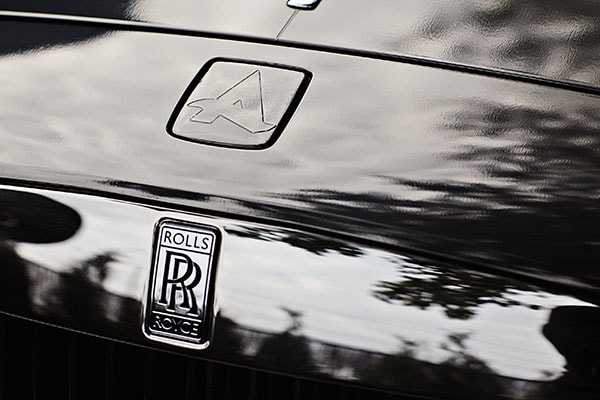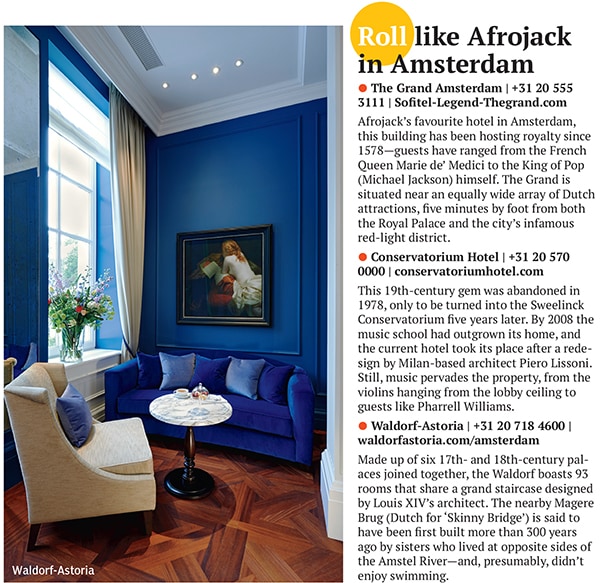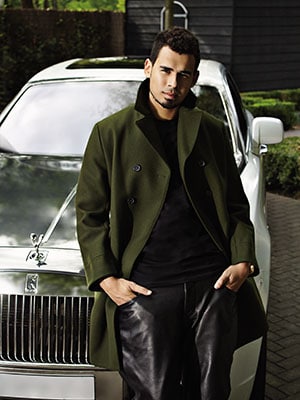
A spin with superstar DJ Afrojack
Nick van de Wall is one of the world's highest-paid DJs, and he's learnt to roll like a man who earned $22 million last year. At his new estate near Amsterdam, Afrojack unveils his car collection-including a Rolls-Royce Ghost and a Ferrari 458-and reveals how his life got on the fast track
Nick van de Wall has just finished a late afternoon lunch of sushi and caviar in Rotterdam and has finally decided on his evening plans: Attending a Lady Gaga show on the other side of The Netherlands. The concert starts in about two hours in Amsterdam, but that’s no problem for the 27-year-old Dutch DJ/producer better known as Afrojack.
His driver and two business managers whip out their phones; within moments, backstage passes at the Ziggo Dome (Amsterdam’s version of Madison Square Garden) have been procured. Afrojack eases his 6-foot-9-inch frame into the back of his new pearl white and black chrome Rolls-Royce Ghost (retail price: $300,000). He kicks up his feet, decked out in neon orange Nike Air Yeezys, which he informs me are the only size-15 pair ever made—regular sizes have been known to fetch $2,000 to $12,000 on eBay—the urban footwear equivalent of his 3-tonne car.
“It’s like being on a monorail,” says Afrojack of his Rolls-Royce (he also owns a yellow Ferrari 458 and a black Audi RS6, both of which boast top speeds in excess of 200 mph). “When you push it, the V12 engine comes loud. It has 650 horsepower. It lifts you off.”
That language is apt, given Afrojack’s recent career trajectory. Since playing his first American gig in 2010, he has worked with artistes from Beyoncé to David Guetta and won a Grammy for his remix of Madonna’s ‘Revolver’. His major label debut, Forget the World, which features acts from Sting to Wiz Khalifa, was released in May. Today he’s one of two DJs with handprints on Hollywood’s Walk of Fame (the other is Guetta) and the first to ring Nasdaq’s closing bell.
“Afrojack is the real deal,” say Grammy-winning sisters Olivia and Miriam Nervo of the electronic duo Nervo, who worked on ‘We’re All No One’ with van de Wall. “He’s an incredibly talented artist and producer who lives and breathes the music he makes and plays. He parties like a rock star and is someone we all look up to.”
And it’s paid off. Last year, Afrojack earned $22 million, more than all but five of his fellow DJs, thanks mostly to nightly fees in excess of $100,000. He plays most of his gigs in clubs such as Hakkasan at the MGM Grand in Las Vegas, but also clocks huge paydays at music festivals and arena shows at local venues like the Ziggo Dome.
As we approach the arena, he points to the side of the building, where an LED display the size of a football field is showing an advertisement for his next show there in a few weeks. He has already sold more tickets than Gaga.
We pull into the VIP parking garage under the arena, and after circling for five minutes looking for a spot large enough, the driver eases the Rolls into a space along the wall.
Afrojack hops out and heads toward the elevator, but not before showing me his car’s favourite feature: With the click of a button, the Ghost’s classic Spirit of Ecstasy hood ornament disappears beneath its chrome-painted hood. It’s replaced by a small, flat panel with a sweeping letter “A”—his logo. He grins. “It’s pretty cool.”
Nick van de Wall’s rise can perhaps be best charted by the evolution of his car collection—or, early on, his distinct lack of transportation. He grew up in the Rotterdam suburb of Spijkenisse, the son of a single Dutch mother and a Surinamese father he never met. His mother, Debbie van de Wall, worked for minimum wage as an aerobics instructor at a nearby gym.
wIn those early years, Afrojack’s exposure to high-end automobiles was limited to videogames. “I always loved cars,” he says. “I used to play Need for Speed all the time … any racing game.”
He had better access to musical instruments, thanks to classes at his school, where he started playing piano at age 7. Within four years he had downloaded music production software and was creating mixes of his own. Then, at age 15, he went to a nightclub for the first time. He was amazed to find 5,000 people together in one room, dancing to deep underground electronic music.
“That’s basically when I said, ‘This is what I want to do,’” he recalls. “I want to DJ.”
At school, though, young van de Wall often felt unhappy. He couldn’t figure out what made people popular or unpopular, why dressing a certain way was important. Though he had plenty of ability, he wasn’t a terrific student. So when he completed high school, he considered stopping his education to focus on music. Much to his surprise, his grandmother encouraged him.
“You’re my grandma, you’re my family, and you’re telling me that if I really want to, I should stop school?” he asked her. “Yes, if that’s what your heart tells you, stop it,” she replied. “Because your heart is always right.”
He spent the next year making music and studying the market. At age 17, he went to Greece to work as a DJ for the summer, working six nights a week from 8 pm to 5 am. His pay: 200 euros a week.
When van de Wall came back, he landed a deal with a Dutch label and released his first song, “In Your Face,” which quickly went to No. 1 on the local dance charts. It didn’t catch on internationally but gave him plenty of opportunities to play gigs in The Netherlands, where he had begun to make a name for himself as the lanky teenager with the prodigious Afro.
“When I started producing I was just making music under all different names,” he recalls. “Black Afro. Super Grandmaster. Mister Bull. Like, the most stupid, idiotic names. Afrojack was one of those idiotic names.”

Big wheel: With the press of a button, the hood ornament on Afrojack’s Rolls-Royce Ghost can be replaced with his own logo
As the gigs started to pour in from not only clubs in Amsterdam and Rotterdam but also locations in Belgium, France and Germany, Afrojack suddenly found himself with the means—and the need—to buy a car. His first was a 1989 Suzuki Swift, which he purchased for about $1,000. Soon he was playing gigs in five different cities every weekend and driving 100,000 kilometres per year. It was a heavy workload, but he had never been more content.
“The only way you can be happy is if you be completely yourself,” he says. “You have to be you. Don’t be what you think you should be.”
Demand for his services continued to surge, enabling him to trade the Suzuki for a 1996 Volkswagen Passat within a year. Twelve months later, he leased an Audi A5 (“It came so close to a sports car, that thing was just awesome”). Two years after that, he bought a BMW M6 (“Speaks for itself, 540 horsepower and reaches 326 kilometres per hour”). Next came the Audi R8, Tony Stark’s car in the Iron Man movies (“When I had the A5, I loved the R8… but I couldn’t afford it”).
By this point, the price of potential additions to his car collection was rapidly becoming irrelevant. Still only 24 years old, Afrojack had conquered the European club scene and was becoming one of the top names on the American circuit, where electronic music had been rechristened EDM, a sudden staple of the biggest nightspots and music festivals in the country.
In 2011, Afrojack released the platinum smash hit ‘Take Over Control’ and co-wrote and produced the Ne-Yo and Pitbull single ‘Give Me Everything’, which went on to sell more than 5 million copies worldwide. That paved the way for the creation of his own label, Wall Recordings, and a multimillion-dollar deal to become a resident DJ at billionaire Steve Wynn’s Las Vegas clubs, including Tryst and XS.
“I never dreamt of that in my life,” he says. “I never expected anything like that to happen. But my music got picked up in America... It was a whole different level.”
The following year Afrojack landed at No. 9 on Forbes’ inaugural Electronic Cash Kings list with earnings of $9 million. He used a portion of the spoils to buy an Audi RS6—a station wagon sleeper with 730 horsepower and a top speed of 220 mph, which he verified on a closed track in Germany.
That same year he reportedly became romantically involved with Paris Hilton—and tested his latest car’s endurance with a trip from Rotterdam to her namesake city with a group of friends. He notes that he completed the 300-mile journey in two and a half hours, which translates to an average speed of 120 mph.
“I don’t mind that he has these cars,” says his mother, Debbie. “I mind that he’s driving them a little faster than he should!”
His next purchase was a fateful one: A $240,000 Ferrari 458. Ironically, it was while driving rather slowly that Afrojack got into what he says is his only accident—the same day he purchased the 458, he spun out on a patch of oil slick at 45 miles per hour and crashed. He emerged unscathed, but the same couldn’t be said for the car.
“Cars for me are like a piece of art,” he explains. “Even though I was really happy that I was completely fine and alive. ...I also felt bad that I just wrecked an art piece.”
When he received his insurance payment for the 458, he plowed the cash into a new showpiece: A Lamborghini Aventador. He certainly didn’t change his ways, though: About a week later, he was racing a friend—Aventador versus R8—when a highway patrolman pulled them over. He was ticketed doing 90 mph, 30 miles per hour over the limit, which in The Netherlands results in an automatic license suspension (he says he was actually doing more than 200).

Still, he doesn’t blame the authorities for doing their job: “I think that’s good that they enforce the rule, because [otherwise] everyone would drive like maniacs.” He sold the offending Aventador; as soon as he got his license back, he began shopping for a replacement. Though he test-drove a Ferrari F12, he settled on an old friend, the 458.
“I remembered why I bought it in the first place. … It’s just the most aggressive Ferrari out there,” says Afrojack. “It screams at you. It’s like a bull-riding contest, while the F12 is like a really fast sparrow. A sparrow is cute but boring, no matter how fast it flies.”
These days, Afrojack usually lets his driver apply pressure to the gas pedal, preferring to recline in the back of his Ghost, answering emails, making music and plotting his next career moves.
Not long after the birth of his 2-year-old daughter, he purchased a 15-acre spread in the woods between Amsterdam and Rotterdam. Before he completed construction of his house, he built a full recording studio complete with a vocal booth, a six-figure speaker system and a sleeping loft so he can work on music nonstop (he says he sometimes does so for 16 hours on end).
“I have a whole team I have to work with that I have to make proud,” he says. “I have fans that look up to me that I have to make proud. … So I have a lot of responsibilities.”
Though Afrojack says he’s “always” plotting his next automobile acquisition—and recently purchased a matte-grey Audi Q7 for his mother—he’s currently focusing his energies on turning his brand as a DJ into something broader.
He’s already worked closely with G-Star on a capsule collection and both Wynn and Hakkasan on nightspots, but he’d like to create his very own ventures in each category. Still, he knows there’s a long way to go.
“Richard Branson’s balling,” he says. “[Carlos Slim] is balling. I ain’t nowhere near balling.”
(Additional reporting by Ryan Mac and Natalie Robehmed.)
(This story appears in the Jan-Feb 2015 issue of ForbesLife India. To visit our Archives, click here.)







